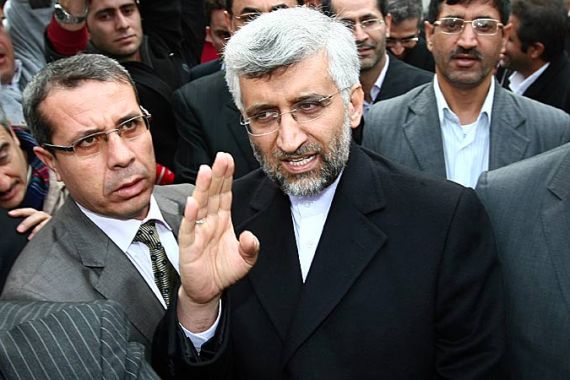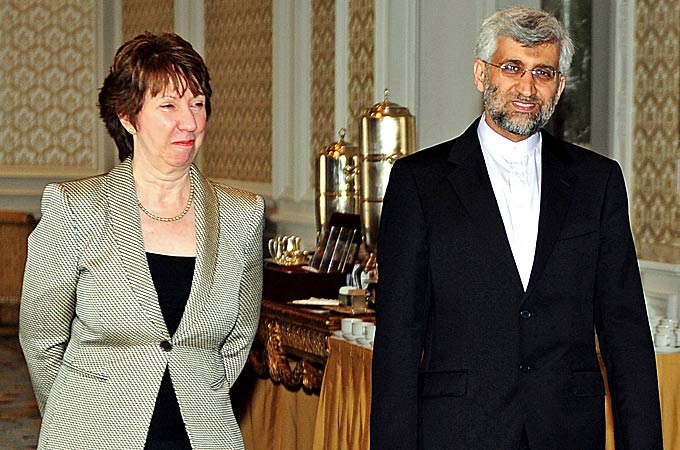Iran defiant at nuclear talks
Tehran says its uranium-enrichment drive is not up for debate as it meets world powers for fresh talks in Istanbul.

 |
| Jalili, right, Iran’s chief nuclear negotiator, held talks with world powers led by Ashton, the EU foreign policy chief [EPA] |
Iran has its uranium-enrichment drive is not up for debate as it met with world powers for fresh talks in Istanbul aimed at easing concerns that it is secretly developing atomic weapons, a charge it denies.
An Iranian delegation led by Saeed Jalili, Iran’s chief nuclear negotiator, met with the so-called P5+1 group of world powers, led by Catherine Ashton, the EU foreign policy chief, on Friday.
Abolfazl Zohrevand, an aide to Jalili, said: “We will absolutely not allow the talks to go into the issue of our basic rights like the issue of suspending enrichment.”
Zohrevand said that the meeting, held behind closed doors at a seafront Ottoman palace, had kicked off in a “positive” atmosphere.
“We will focus on co-operation … The talks have been positive because both sides have come to take positive steps,” he said, without elaborating.
It was the second round of talks between Iran and delegates from Britain, China, France, Russia, Germany and the US after negotiations resumed last month in Geneva, breaking a 14-month hiatus.
Iran insists its nuclear programme is solely for civilian purposes, but has refused to suspend uranium enrichment, the sensitive process which can be used to make nuclear fuel or, in highly extended form, the fissile core of an atomic bomb.
Its position has prompted four sets of UN sanctions, coupled by a series of separate sanctions imposed unilaterally by the US and the EU.
The talks in the Turkish city will resume on Saturday.
Fuel swap
A Western diplomat familiar with the talks in Istanbul who wished to remain anonymous said the world powers would still be pushing Iran to consider a nuclear fuel swap proposal, designed to ease concerns over the Islamic republic’s activities.
The swap “will be discussed in Istanbul”, he said, but stressed the terms of the proposal, first discussed in 2009, should be modified.
Under the original draft, Iran would have received fuel for a medical research reactor in Tehran from France and Russia in return for shipping out most of its stockpiles of low-enriched uranium.
After a prolonged stalemate over the proposal, Brazil and Turkey brokered a modified deal in May.
But the US rejected it, arguing it failed to take into account additional uranium Iran enriched in the meantime, and led the UN Security Council in imposing a fourth package of sanctions.
Turkey, which voted against the sanctions and has refused to back a tougher line against its eastern neighbour, is only the host of the Istanbul talks but “is ready to step in if the two sides request its help”, a Turkish diplomat said.
No retreat
The US stressed the need for Iran to engage in a “credible process” to dispel suspicions over its nuclear activities.
“We’re not expecting any big breakthroughs,” Mark Toner, a state department spokesman, said in Washington before the meeting.
“But we want to see a constructive process emerge that … leads to Iran engaging with the international community in a credible process and engaging and addressing the international community’s concerns about its nuclear programme.”
On the eve of the talks, Russia, which for the past decade has been building Iran’s sole nuclear power plant, called for talks on lifting the UN sanctions on Tehran but Western diplomat played down the idea Friday.
On Wednesday, Mahmoud Ahmadinejad, the Iranian president, told a cheering crowd that Tehran would not back down on the issue of its nuclear programme.
“You could not stop us from being nuclear … The Iranian nation will not retreat an inch. The nuclear issue is over from the Iranian point of view,” he said.